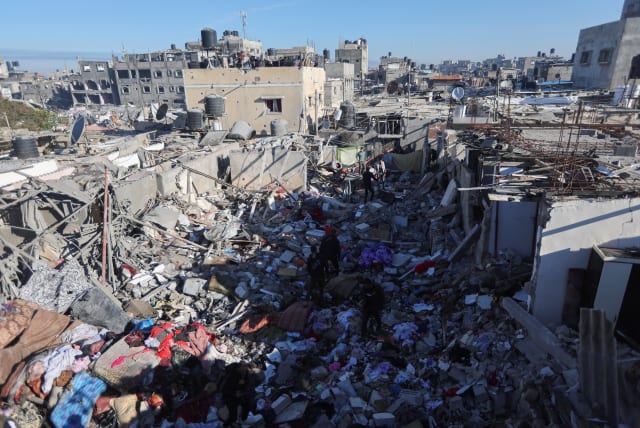Crush and eliminate Hamas: Navigating ties with Hezbollah, Iran, and Saudi Arabia - analysis

Normalization with Saudi Arabia is crucial but shouldn't come at the cost of significant concessions.
After over six months of fighting in Gaza and the North, including direct attacks from Iran and measured responses from Israel, the nation faces difficult decisions. Political and military leadership must address four key interrelated challenges, each involving external factors with interests often misaligned with Israel's.
Following the barbaric attack on October 7, the Israeli Defense Forces (IDF) deployed at full strength, aiming to fulfill the Cabinet's directives to "crush and eliminate Hamas in Gaza, strip it of military, governmental, and organizational capabilities, and kill its leaders. And to bring back all the hostages safely."
These two tasks—fighting Hamas and retrieving the hostages—are at the core of Israel's immediate challenges, and their success is tightly linked, despite some views trying to undermine or even object the linkage. After successful operations in northern and central Gaza, the IDF now must focus on Rafah, the central camps, and the Philadelphi Corridor, targeting both above and underground.
Only "consistent military pressure" on Hamas can lead to the hostages' release, either through negotiation or military operation. There's little chance of reaching a deal with Hamas using current approaches, including the latest Egyptian proposal. Israeli concessions would only encourage further pressure from Hamas.
There is no incentive for Hamas to agree to a deal, especially since it believes it can achieve its full objectives without one. Unfortunately, many contribute to this belief, mainly from outside of Israel, but also from within.
Recent months saw Israel mistakenly refraining from entering Rafah for several reasons. Initially, the main justified reason aimed to give a chance to negotiate a deal with Hamas. However, as it became clear that Hamas was uninterested, and its only goal was to return to its situation before Oct. 7, where Hamas and its leadership controlling Gaza, Israel forces are out and there are no changes in the borders, the deal didn’t mature. Other mistaken factors played into Israel's hesitation, including Ramadan, American, and Egyptian pressure to avoid humanitarian damage, and Israel's desire to regroup and prepare for extended fighting, including in the North.
Intense discussions ongoing about Rafah operation
The Cabinet had intense discussions about the alternatives and the plans presented by the IDF, including when to enter Rafah, how to evacuate the population, and how to close the breaches in the Gaza-Egypt border that allowed Hamas to rearm in the years leading up to October 7 and after.
In the coming days, there may be announcements for Rafah's residents to evacuate to safer areas, where they can receive better aid. It must be clear that the fighting will continue as long as all the war goals are not achieved, and maybe then the Hamas will accept a deal (the chances are low).
The entrance of Egypt to the mediator position and their new proposal are meant to fail and Israel willingness for more concessions is a big mistake, at this point.
While entering Gaza, Israel must coordinate with Egypt the solution to Philadelphi Corridor on Gaza soil, without agreeing to some of their demands (like a Palestinian state) that was just presented to Israel's chief of staff and the head of the Shin Bet (Israel Security Agency). The illusions of a solution based on technology, Egyptian forces, and Israeli remote control are totally wrong, as we learned during the Oct. 7 attack. Only total Israeli control will guarantee no refugees pled to Egypt and no armed smuggling to Gaza.
Hezbollah poses another major challenge to Israel's northern border, connected to the fight in Gaza and with Iran, with hundreds of incidents since the fighting in Gaza began.
Israel has responded forcefully, with the defense minister stating, "About half of [Hezbollah's] southern commanders have been eliminated," and much of its capabilities along Israel's northern border were "severely damaged." While the IDF has caused significant damage to Hezbollah's infrastructure, the group still has considerable missile stockpiles and a network of tunnels.
Although Hezbollah is reluctant to escalate further, given the destruction in Gaza and Lebanon, it retains the ability to strike deep into Israeli territory. The key goal for Israel is to ensure that northern residents can return home safely and to delay for now a large-scale conflict with Hezbollah.
Despite these immediate military challenges, the Iranian challenge remains a central concern. Iran's pursuit of nuclear capabilities continues, but it looks like the Cabinet, underestimating the danger, prefers focusing instead on ending the first conflicts in Gaza and the North. Assuming Iran shares an interest in avoiding escalation.
The fourth challenge is mainly political, with President Biden's administration pushing for broader American-Saudi arrangement ahead of the November elections, either with or without Israel ( a normalization agreement between Israel and Saudi Arabia).
Senior figures in Israel view normalization as critical despite the heavy concessions involved, including those related to Rafah, Saudi nuclear ambitions, and even the Palestinian issue, whose importance in Saudi Arabia has increased following the war.
Some Israeli leaders even persist with the mistaken belief that a defense pact with the US would be beneficial to Israel, despite the current conflict showing totally otherwise. The benefits of a defense pact can be obtained without the significant costs and limitations it might impose on Israel.
Israel must now focus on completing its mission in Gaza (Rafah, Philadelphi Corridor, and the return of hostages), pursue a temporary solution in the North to allow residents to return home safely, and ensure Iran doesn't use the conflict as a distraction to advance its nuclear program.
Normalization with Saudi Arabia is important and crucial but shouldn't come at the cost of significant concessions, particularly not those relating to Gaza, Saudi nuclear capabilities, or agreements or declarations toward a Palestinian state.
Brig.-Gen. (res.) Jacob Nagel is a senior fellow at the Foundation for Defense of Democracies (FDD) and a professor at the Technion. He served as National Security Advisor to Prime Minister Netanyahu and as acting head of the National Security Council
Jerusalem Post Store
`; document.getElementById("linkPremium").innerHTML = cont; var divWithLink = document.getElementById("premium-link"); if (divWithLink !== null && divWithLink !== 'undefined') { divWithLink.style.border = "solid 1px #cb0f3e"; divWithLink.style.textAlign = "center"; divWithLink.style.marginBottom = "15px"; divWithLink.style.marginTop = "15px"; divWithLink.style.width = "100%"; divWithLink.style.backgroundColor = "#122952"; divWithLink.style.color = "#ffffff"; divWithLink.style.lineHeight = "1.5"; } } (function (v, i) { });

